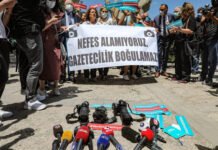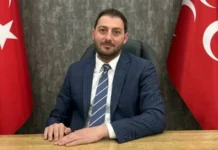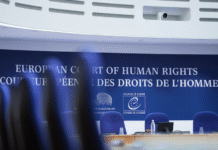The Council of State, Turkey’s highest administrative court, has rejected a request for compensation filed by Mustafa Başnamlı, a man who was severely injured due to police brutality during the nationwide Gezi Park protests in 2013, Deutsche Welle Turkish service reported.
Başnamlı had sued the Ministry of Interior for pecuniary and non-pecuniary damages, but his previous lawsuits had been rejected by lower administrative courts on the grounds of a lack of “a clear and undeniable causality between the damage that occurred and the law enforcement actions.”
His lawyer, Saliha Şahin, announced that they would take the case to the Constitutional Court.
“The state has responsibilities stemming from the use of dangerous equipment,” Şahin said, complaining about a climate of impunity surrounding injuries that occurred during the Gezi Park protests due to the authorities’ failure to identify the police officers who caused them.
“The failure of the judiciary to establish causal links naturally leads to an increase in police brutality, granting legitimacy to authoritarianism.”
Başnamlı was one of the protesters who had gathered in Ankara’s Güvenpark in June 2013 in reaction to the police brutality taking place in İstanbul. He was hit near the left eye by a tear gas canister fired by the police to disperse the crowd, which fractured bones in his face. Three platinum plates were attached to his facial bone structure.
The Council of Forensic Medicine (ATK) reported in 2013 that Başnamlı’s injuries were beyond what could be repaired by simple medical procedures and that the bone fractures severely impacted his ability to lead a normal life.
The 2013 Gezi Park protests erupted over government plans to demolish Gezi Park in Taksim. They quickly turned into mass anti-government demonstrations that were violently suppressed by the government, leading to the death of 11 protestors due to the use of disproportionate force by the police.
The violent government response to the demonstrations is considered by many to have been one of the early signs of Turkey’s authoritarian downturn.
Several journalists, filmmakers and civil society figures were prosecuted and handed down lengthy prison sentences over their alleged role in the protests, including businessman and philanthropist Osman Kavala, who since 2017 has been held behind bars despite a European Court of Human Rights order for his release.
Turkey was ranked 117th among 142 countries in the rule of law index published by the World Justice Project (WJP) in October, dropping one rank in comparison to last year.















